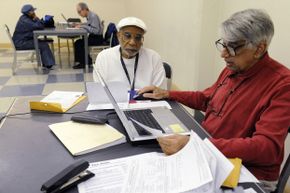Kids are the worst, right? They're always like, "I'm too busy to explain to you why something exists," or "Please don't bother me with your legitimate questions about the things I'm doing."
Oh, wait. That's adults. Those guys are the worst.
Advertisement
So let's give kids a break and give them what they ask for: a few lessons on why the heck the grown-ups are spending their evenings poring over receipts and asking each other questions like, "Wait, can we write off that lobster we bought for Beverly if I complained about work the entire dinner?"
We'll start with the basics. Who, precisely, are adults helping when they pay their taxes?













